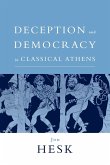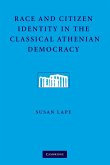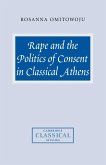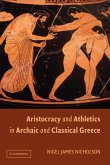- Broschiertes Buch
- Merkliste
- Auf die Merkliste
- Bewerten Bewerten
- Teilen
- Produkt teilen
- Produkterinnerung
- Produkterinnerung
This book explores the assumptions and principles determining the conduct and representation of interstate politics.
Andere Kunden interessierten sich auch für
![Festivals, Feasts, and Gender Relations in Ancient China and Greece Festivals, Feasts, and Gender Relations in Ancient China and Greece]() Yiqun ZhouFestivals, Feasts, and Gender Relations in Ancient China and Greece60,99 €
Yiqun ZhouFestivals, Feasts, and Gender Relations in Ancient China and Greece60,99 €![Women and Humor in Classical Greece Women and Humor in Classical Greece]() Laurie O'HigginsWomen and Humor in Classical Greece40,99 €
Laurie O'HigginsWomen and Humor in Classical Greece40,99 €![Deception and Democracy in Classical Athens Deception and Democracy in Classical Athens]() Jon HeskDeception and Democracy in Classical Athens52,99 €
Jon HeskDeception and Democracy in Classical Athens52,99 €![Race and Citizen Identity in the Classical Athenian Democracy Race and Citizen Identity in the Classical Athenian Democracy]() Susan LapeRace and Citizen Identity in the Classical Athenian Democracy63,99 €
Susan LapeRace and Citizen Identity in the Classical Athenian Democracy63,99 €![Rape and the Politics of Consent in Classical Athens Rape and the Politics of Consent in Classical Athens]() Rosanna OmitowojuRape and the Politics of Consent in Classical Athens50,99 €
Rosanna OmitowojuRape and the Politics of Consent in Classical Athens50,99 €![Classical Scholarship and Classical Learning Classical Scholarship and Classical Learning]() John William DonaldsonClassical Scholarship and Classical Learning34,99 €
John William DonaldsonClassical Scholarship and Classical Learning34,99 €![Aristocracy and Athletics in Archaic and Classical Greece Aristocracy and Athletics in Archaic and Classical Greece]() Nigel NicholsonAristocracy and Athletics in Archaic and Classical Greece50,99 €
Nigel NicholsonAristocracy and Athletics in Archaic and Classical Greece50,99 €-
-
-
This book explores the assumptions and principles determining the conduct and representation of interstate politics.
Hinweis: Dieser Artikel kann nur an eine deutsche Lieferadresse ausgeliefert werden.
Hinweis: Dieser Artikel kann nur an eine deutsche Lieferadresse ausgeliefert werden.
Produktdetails
- Produktdetails
- Verlag: Cambridge University Press
- Seitenzahl: 324
- Erscheinungstermin: 30. September 2009
- Englisch
- Abmessung: 216mm x 140mm x 19mm
- Gewicht: 459g
- ISBN-13: 9780521124287
- ISBN-10: 052112428X
- Artikelnr.: 27870258
- Herstellerkennzeichnung
- Libri GmbH
- Europaallee 1
- 36244 Bad Hersfeld
- gpsr@libri.de
- Verlag: Cambridge University Press
- Seitenzahl: 324
- Erscheinungstermin: 30. September 2009
- Englisch
- Abmessung: 216mm x 140mm x 19mm
- Gewicht: 459g
- ISBN-13: 9780521124287
- ISBN-10: 052112428X
- Artikelnr.: 27870258
- Herstellerkennzeichnung
- Libri GmbH
- Europaallee 1
- 36244 Bad Hersfeld
- gpsr@libri.de
POLLY LOW is Lecturer in Ancient History at the University of Manchester.
Introduction
Part I. International Relations and Ancient History: 1. A case study: Professor Sir Alfred Zimmern
2. Traditions of international relations: the history of the discipline
3. International relations and ancient history
4. Idealism, realism, and the problem of norms
5. Conclusion: the Ecclesia and the League of Nations
Part II. Structuring Interstate Relations: 1. Introduction: society, system, and anarchy
2. No such thing as society? A system of reciprocal relationships
3. Reciprocity as the basis for a society
4. Multilateral societies and panhellenic communities
5. Conclusion: some examples
Part III. An Anarchic Society? International Law and International Custom: 1. Introduction: law and society
2. Greek law, international law and Greek international law
3. The sources and scope of Greek international law
4. Application, enforcement and the problem of sanctions
5. Conclusions
Part IV. Domestic Morality, Interstate Morality: 1. Introduction: a domestic analogy?
2. Moral language: individuals and groups, selves and others
3. Assumptions of and arguments for similarity
4. Arguments for difference? Power, self-interest and justice
5. Conclusions
Part V. Norms and Politics: The Problem of Intervention: 1. Introduction: the importance of intervention
2. Helping the wronged: intervention as an ideal
3. Intervention, autonomy and autonomia
4. Intervention, imperialism and ideology
5. Conclusions
Part VI. Stability and Change: 1. Introduction: an evaded dimension
2. A stable system
3. The problem of Thucydides
4. The Athenian Empire: structures, institutions and ethics
5. Conclusion.
Part I. International Relations and Ancient History: 1. A case study: Professor Sir Alfred Zimmern
2. Traditions of international relations: the history of the discipline
3. International relations and ancient history
4. Idealism, realism, and the problem of norms
5. Conclusion: the Ecclesia and the League of Nations
Part II. Structuring Interstate Relations: 1. Introduction: society, system, and anarchy
2. No such thing as society? A system of reciprocal relationships
3. Reciprocity as the basis for a society
4. Multilateral societies and panhellenic communities
5. Conclusion: some examples
Part III. An Anarchic Society? International Law and International Custom: 1. Introduction: law and society
2. Greek law, international law and Greek international law
3. The sources and scope of Greek international law
4. Application, enforcement and the problem of sanctions
5. Conclusions
Part IV. Domestic Morality, Interstate Morality: 1. Introduction: a domestic analogy?
2. Moral language: individuals and groups, selves and others
3. Assumptions of and arguments for similarity
4. Arguments for difference? Power, self-interest and justice
5. Conclusions
Part V. Norms and Politics: The Problem of Intervention: 1. Introduction: the importance of intervention
2. Helping the wronged: intervention as an ideal
3. Intervention, autonomy and autonomia
4. Intervention, imperialism and ideology
5. Conclusions
Part VI. Stability and Change: 1. Introduction: an evaded dimension
2. A stable system
3. The problem of Thucydides
4. The Athenian Empire: structures, institutions and ethics
5. Conclusion.
Introduction
Part I. International Relations and Ancient History: 1. A case study: Professor Sir Alfred Zimmern
2. Traditions of international relations: the history of the discipline
3. International relations and ancient history
4. Idealism, realism, and the problem of norms
5. Conclusion: the Ecclesia and the League of Nations
Part II. Structuring Interstate Relations: 1. Introduction: society, system, and anarchy
2. No such thing as society? A system of reciprocal relationships
3. Reciprocity as the basis for a society
4. Multilateral societies and panhellenic communities
5. Conclusion: some examples
Part III. An Anarchic Society? International Law and International Custom: 1. Introduction: law and society
2. Greek law, international law and Greek international law
3. The sources and scope of Greek international law
4. Application, enforcement and the problem of sanctions
5. Conclusions
Part IV. Domestic Morality, Interstate Morality: 1. Introduction: a domestic analogy?
2. Moral language: individuals and groups, selves and others
3. Assumptions of and arguments for similarity
4. Arguments for difference? Power, self-interest and justice
5. Conclusions
Part V. Norms and Politics: The Problem of Intervention: 1. Introduction: the importance of intervention
2. Helping the wronged: intervention as an ideal
3. Intervention, autonomy and autonomia
4. Intervention, imperialism and ideology
5. Conclusions
Part VI. Stability and Change: 1. Introduction: an evaded dimension
2. A stable system
3. The problem of Thucydides
4. The Athenian Empire: structures, institutions and ethics
5. Conclusion.
Part I. International Relations and Ancient History: 1. A case study: Professor Sir Alfred Zimmern
2. Traditions of international relations: the history of the discipline
3. International relations and ancient history
4. Idealism, realism, and the problem of norms
5. Conclusion: the Ecclesia and the League of Nations
Part II. Structuring Interstate Relations: 1. Introduction: society, system, and anarchy
2. No such thing as society? A system of reciprocal relationships
3. Reciprocity as the basis for a society
4. Multilateral societies and panhellenic communities
5. Conclusion: some examples
Part III. An Anarchic Society? International Law and International Custom: 1. Introduction: law and society
2. Greek law, international law and Greek international law
3. The sources and scope of Greek international law
4. Application, enforcement and the problem of sanctions
5. Conclusions
Part IV. Domestic Morality, Interstate Morality: 1. Introduction: a domestic analogy?
2. Moral language: individuals and groups, selves and others
3. Assumptions of and arguments for similarity
4. Arguments for difference? Power, self-interest and justice
5. Conclusions
Part V. Norms and Politics: The Problem of Intervention: 1. Introduction: the importance of intervention
2. Helping the wronged: intervention as an ideal
3. Intervention, autonomy and autonomia
4. Intervention, imperialism and ideology
5. Conclusions
Part VI. Stability and Change: 1. Introduction: an evaded dimension
2. A stable system
3. The problem of Thucydides
4. The Athenian Empire: structures, institutions and ethics
5. Conclusion.








